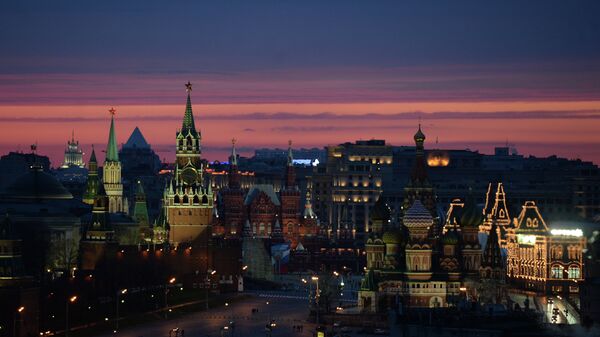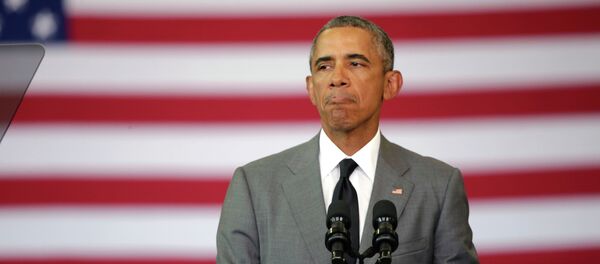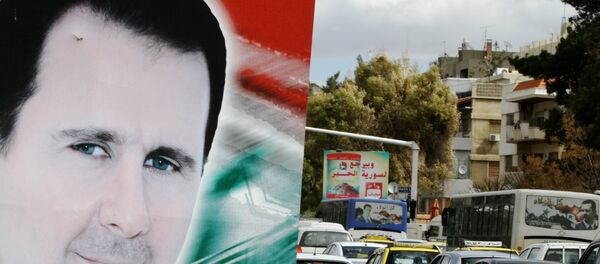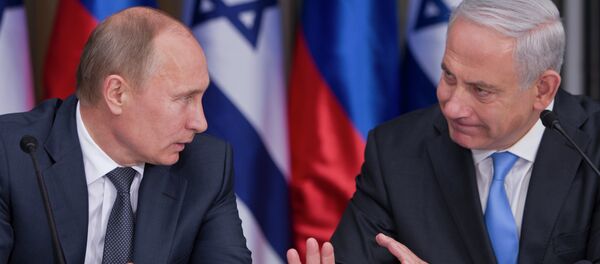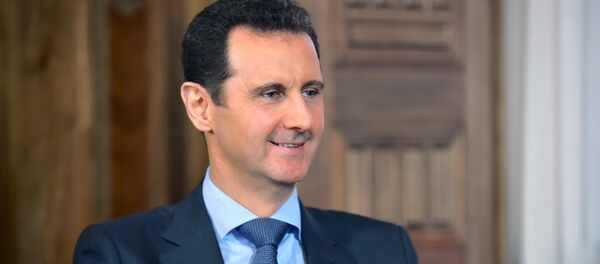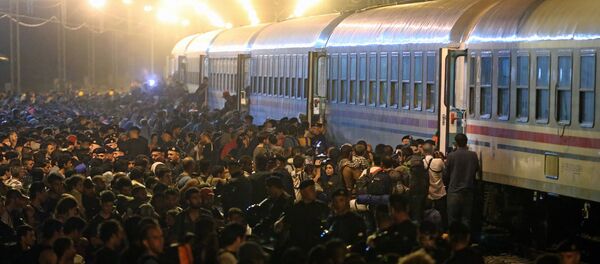In his piece, Leventhal argues that Russia has come to assist Syria at "just the right moment," shoring up support for the Syrian government ahead of the 70th UN General Assembly meeting in New York later this month, "where Vladimir Putin plans to make a speech on the victories of Russian diplomacy."
The journalist believes that the Russian leader has something to celebrate, with "his goal of returning Russia's superpower status and influence in the international arena gradually being achieved." Levanthal notes that to a great extent, this has to do with Moscow's continuing support for the Syrian government, including the provision of advanced weaponry for the country's military, as well as the expansion of Russia's military presence in the area via the construction of a large air base in Latakia.
Leventhal proposes that "from a tactical point of view, Putin has chosen the perfect moment," suggesting that Russia is "supporting Assad's flagging army, which is losing territory and suffering casualties."
The columnist notes that "from a strategic point of view, the moment is also very well-chosen, coming on the eve of the 70th Session of the UN General Assembly. At the end of the month, heads of state from around the world will arrive in New York. On the meeting's agenda will be the wars in the Middle East and the migration crisis in Africa which they have spawned."
"Appearing on the podium of the UN on September 28, following a ten-year absence, Vladimir Putin will not be coming empty-handed," Leventhal noted. "He will outline his proposal to resolve the crisis in Syria, including proposals for dialogue between Assad and the so-called 'healthy opposition', that is, the Free Syrian Army and moderate opposition. He will propose the formation of a coalition for the fight against ISIL, but in a form which suits Russia."
In this vein, according to the journalist, Moscow's support for Assad in the Syrian conflict has turned Russia "into a diplomatic factor which the UN will have to take account of. This is a major success for Putin, turning his country into an initiator of processes in the international arena."
"Slowly but surely, Putin is using the West's confusion and the United States' isolationist aspirations following the trauma remaining from the occupation of Afghanistan and Iraq to strengthen Russia's position," the journalist argued.
The journalist cited Russia's closening relations with the Egyptian government of President Abdel Fattah el-Sisi, who, in Leventhal's view, has "become an ally of Moscow." Leventhal recalled that "Russia is supplying weapons to the Egyptian army, is assisting it in its fight against Jihadist terrorist groups, and is promoting a project to build Egypt's first nuclear power plant. Sisi also invited Putin to take part in the dedication ceremony of the opening of the expanded of the Suez Canal, but the Russian leader eventually sent the prime minister in his place instead. In May and August, Putin hosted the Egyptian president, who promised to support Russia's proposals on Syria."
Leventhal noted that in its efforts "to gain influence in the Middle East and around the world," Russia has also developed "active contacts among the Arab Gulf states, including Saudi Arabia, hoping to persuade them to also accept Moscow's initiative on Syria. Recently, the leaders of many Middle Eastern countries have visited Russia, including Jordan's King Abdullah II, one of the US's main allies. He acknowledged Russia's importance by noting that the Syrian conflict must be resolved, and that Russia plays a crucial role in uniting the forces of the Syrian opposition and bringing them to a dialogue to resolve the crisis."
Preventing a Bad Situation From Becoming Worse
Continuing his line of thought, Leventhal recalled that "this week, Putin explained that without Russia's assistance, the situation in Syria would have been much worse, the country would fall into the hands of ISIL, Europe would see more refugees, and the situation would be even more dire than that the one which has emerged in Libya today. Nikolai Kozhanov, who previously served as Russia's military attaché in Tehran, told CNN about Russia's strategy. He explained that while Russia is not going to do the fighting for Assad, Moscow believes that the Syrian government is playing a key role in the fight against ISIL, and that apart from Assad's armies, there are no real alternatives" to do the job.
Citing Western intelligence services, the journalist emphasized that "Russia will not win Assad's war for him; rather, it will assist him in hanging on to the territory under his control. Kozhanov noted that Russia is not going to send troops to conquer Syria, having seen the results of the American invasion of Iraq." Moreover, Russia could not launch a ground operation in Syria even if it wanted to, according to Levanthal, given the country's limited financial resources.
Indulging his readers, many of whom are no doubt used to the mantra that Assad is a brutal dictator who must be deposed, Levanthal noted that while "Assad is a dictator, Syria under his rule has maintained stability and order." The journalist recalled that Syria's ongoing destabilization is a repeat of events in countries including Iraq and Libya, suggesting that chaos and national disintegration would result if Assad, like Hussein in Iraq and Gaddafi in Libya, was to fall.
Russia Steps Up to Fill Void Left by the West
The journalist argued that "Putin's proactive approach has taught the US and its Western allies, who have demanded that Assad must go and accused him of dictatorial rule and provoking the rise of ISIL, a good lesson. Russia asserts that it was the US invasion of Iraq which planted the seeds of chaos, leading to the skyrocketing rise of the extremist group, and insists that Assad is not the root of the problem, but the key to its resolution."
Ultimately, in Levanthal's view, "the West is facing defeat in Syria, because it has chosen negative diplomacy. On the one hand, the West steps out against ISIL. On the other, it demands Assad's removal. But where are the West's positive suggestions? Who should rule Syria and how? The US adopted a program to mobilize Syrian rebels, but was able to attract only a few hundred people. The Free Syrian Army, for better or for worse, is also weak. The third force after ISIL and the Syrian army are Jihadist groups, including al-Qaeda's Syrian branch, Jabhat al-Nusra."
In the journalist's view, "Putin's consistency in supporting Assad from the very beginning of Syria's civil war has borne fruit. It appears likely that Putin will be able to celebrate a great victory, the value of which outweighs the situation in Syria itself. Putin's statements about Russia's role in the resolution of global conflicts have sounded loud and clear."
